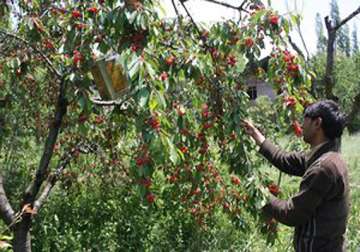Himachal readies for a cherry boom
Shimla, Apr 25: With cherry orchards turning crimson and production likely to be 250 tonnes more than last year's 412 tonnes, the luscious fruit is literally on everyone's mouth in Himachal Pradesh."We are expecting a

Shimla, Apr 25: With cherry orchards turning crimson and production likely to be 250 tonnes more than last year's 412 tonnes, the luscious fruit is literally on everyone's mouth in Himachal Pradesh.
"We are expecting a bumper crop after two consecutive lean seasons," Horticulture Director Gurdev Singh told IANS.
He said some early cherry varieties from orchards have already hit the markets and are commanding good prices.
"Though there were reports of damage to the crop in some areas in upper Shimla in recent hailstorms, overall the crop is good and healthy," Gurdev Singh added.
Horticulture experts say the harvesting of the crop would pick up in the first week of May and would continue till June-end. The cherry orchards are mainly in Shimla, Kullu, Mandi and Chamba districts.
The higher reaches of the state - Kullu, Mandi and Chamba districts - known for growing the country's juicy apples, are ideal for cherry and kiwi cultivation too. The hub of cherry cultivation is Narkanda, Kotgarh, Kotkhai and Thanedar in upper Shimla.
"A box (1 kg) of ordinary red cherries is fetching around Rs.200 in Shimla's retail market these days, which is quite good," Gopal Mehta, a prominent cherry grower of Kotgarh, told IANS.
He said by next week, when top varieties that are deep red would start arriving, the prices of the early varieties would automatically tumble.
Last year the top black cherries picked from organic farms fetched between Rs.500 and Rs.700 a box in Delhi's departmental stores even at the end of June, when the season is about to be over.
"The market remained high throughout the season last year as the production was slightly less than normal," Mehta added.
Trade representatives here said the imported cherry varieties like 'deuro nera', 'stella', 'merchant' and 'celsius', which have a longer shelf life, would command a good demand.
They said that for the first time, traders from Mumbai have been camping in Narkanda, some 65 km from Shimla, for procuring cherries directly from the growers.
"Earlier, we were getting traders from Gujarat and Maharashtra during the apple procurement season. This time we got traders from Mumbai (for cherries). It's a good beginning and a cut in transportation costs would benefit growers," Ravi Chauhan, a grower near Thanedar, said.
At least 10,000 small farmers in the state grow over 20 varieties of cherries on about 500 hectares as an alternative fruit crop.
In 2010-11, the state saw a record production of 1,' tonnes of cherries.
The Himachal Pradesh economy is highly dependent on horticulture, apart from hydroelectric power and tourism, with the annual fruit industry worth over Rs.2,500 crore.
In his 2013-14 budget speech, Chief Minister Virbhadra Singh announced that the government would encourage private investment in integrated cold chains, grading, food processing and packaging industries by providing land on lease at concessional rates.
Horticulture department officials say lack of cold chains results in the annual decay of 25 percent of the total fruit produce.
"We are expecting a bumper crop after two consecutive lean seasons," Horticulture Director Gurdev Singh told IANS.
He said some early cherry varieties from orchards have already hit the markets and are commanding good prices.
"Though there were reports of damage to the crop in some areas in upper Shimla in recent hailstorms, overall the crop is good and healthy," Gurdev Singh added.
Horticulture experts say the harvesting of the crop would pick up in the first week of May and would continue till June-end. The cherry orchards are mainly in Shimla, Kullu, Mandi and Chamba districts.
The higher reaches of the state - Kullu, Mandi and Chamba districts - known for growing the country's juicy apples, are ideal for cherry and kiwi cultivation too. The hub of cherry cultivation is Narkanda, Kotgarh, Kotkhai and Thanedar in upper Shimla.
"A box (1 kg) of ordinary red cherries is fetching around Rs.200 in Shimla's retail market these days, which is quite good," Gopal Mehta, a prominent cherry grower of Kotgarh, told IANS.
He said by next week, when top varieties that are deep red would start arriving, the prices of the early varieties would automatically tumble.
Last year the top black cherries picked from organic farms fetched between Rs.500 and Rs.700 a box in Delhi's departmental stores even at the end of June, when the season is about to be over.
"The market remained high throughout the season last year as the production was slightly less than normal," Mehta added.
Trade representatives here said the imported cherry varieties like 'deuro nera', 'stella', 'merchant' and 'celsius', which have a longer shelf life, would command a good demand.
They said that for the first time, traders from Mumbai have been camping in Narkanda, some 65 km from Shimla, for procuring cherries directly from the growers.
"Earlier, we were getting traders from Gujarat and Maharashtra during the apple procurement season. This time we got traders from Mumbai (for cherries). It's a good beginning and a cut in transportation costs would benefit growers," Ravi Chauhan, a grower near Thanedar, said.
At least 10,000 small farmers in the state grow over 20 varieties of cherries on about 500 hectares as an alternative fruit crop.
In 2010-11, the state saw a record production of 1,' tonnes of cherries.
The Himachal Pradesh economy is highly dependent on horticulture, apart from hydroelectric power and tourism, with the annual fruit industry worth over Rs.2,500 crore.
In his 2013-14 budget speech, Chief Minister Virbhadra Singh announced that the government would encourage private investment in integrated cold chains, grading, food processing and packaging industries by providing land on lease at concessional rates.
Horticulture department officials say lack of cold chains results in the annual decay of 25 percent of the total fruit produce.